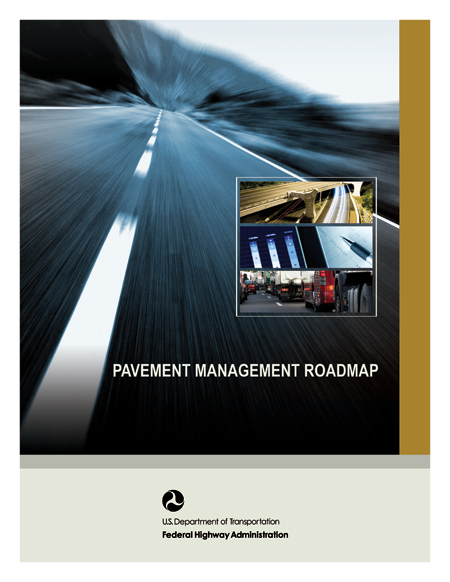U.S. Department of Transportation
Federal Highway Administration
1200 New Jersey Avenue, SE
Washington, DC 20590
202-366-4000
Focus
| Accelerating Infrastructure Innovations |
Publication Number: FHWA-HRT-14-011
Date: March 2014
Printable Version (.pdf, 0.3 mb)
For pavement management, the future is here.
State and Federal Highway Administration (FHWA) projects across the country are expanding the use of existing pavement management tools and technologies and advancing today's new innovations, as well as broadening the role of pavement management in strategically maintaining highway system assets. These projects support the goals of FHWA's Pavement Management Roadmap (Pub. No. FHWA-HIF-11-011).
"The Roadmap identified the steps needed to address current gaps in pavement management and establish research and development initiatives and priorities," said Nastaran Saadatmand of FHWA. FHWA developed the Roadmap with extensive input from stakeholders, including representatives from State and local highway agencies, Canadian government agencies, metropolitan planning organizations, academia, and private industry.
Roadmap -related projects address needs in four areas:
Projects that are helping to meet these needs and advance the Roadmap's long-term goals include the SPS-2 Pavement Preservation experiment initiated by FHWA's Long-Term Pavement Performance (LTPP) program in 2013. Started in 1992, the LTPP program's original SPS-2 experiment (Strategic Study of Structural Factors for Rigid Pavements) is the most comprehensive ongoing concrete research effort in the Nation. The new Pavement Preservation experiment is being conducted through a Transportation Pooled Fund study (Study No. TPF-5(291)). Researchers will use data from the existing SPS-2 sites to determine the most effective concrete preservation strategies for extending the service life of the pavements.
The study is designed to define the proper timing and strategy selection for pavement preservation treatments, enabling more effective infrastructure management and extended pavement life. New tools for determining strategy selection and pavement life extension that can be incorporated into pavement and maintenance management systems will also be developed. Seven States are currently participating in the study. For more information, visit www.pooledfund.org/Details/Study/533, or contact Jack Springer at FHWA, 202-493-3144 (email: jack.springer@dot.gov).
A project conducted under the second Strategic Highway Research Program (SHRP2), Nondestructive Testing to Identify Delaminations Between Hot-Mix Asphalt Layers, evaluated nondestructive testing technologies that can detect the extent, depth, and severity of delamination in hot-mix asphalt pavements. The technologies were also evaluated on whether they could be used to test the full-lane width of a roadway, while operating at a safe traveling speed. Laboratory and full-scale pavement testing were conducted at the National Center for Asphalt Technology, while field evaluations were held in Florida and Kansas. Technologies evaluated included ground penetrating radar, infrared thermography, mechanical waves, and deflectometers.
The top two technologies identified that are ready for project-level use are ground penetrating radar and a scanning mechanical wave system. Information on the top two technologies has been incorporated into a new electronic resource for transportation agencies, the NDToolbox. The Toolbox helps guide agencies in selecting the best technologies to detect a particular deterioration. To use the Toolbox, visit www.ndtoolbox.org. To download the five-volume SHRP2 project report, visit www.trb.org/Main/Blurbs/167281.aspx.
New pavement management technologies under development also include a self-powered wireless sensor system capable of detecting damage and loading history for pavement structures, enabling continuous structural health monitoring of the pavement. This continuous monitoring can help facilitate more effective pavement maintenance and rehabilitation decisionmaking. FHWA's project report, Smart Pavement Monitoring System (Pub. No. FHWA-HRT-12-072), describes the successful development of the sensor system. Additional research is underway to refine the system and enable its implementation by highway agencies. To download the report, visit www.fhwa.dot.gov/publications/research/infrastructure/pavements/12072/12072.pdf.
Details on the more than 80 projects supporting the Roadmap's goals are available on FHWA's Pavement Management Roadmap Web site. Visitors can download the Roadmap and related documents, including project reports. Also featured are links to related publications and Web sites, including State pavement-management related sites, and information on conferences and other events. To view the site's many resources, visit www.fhwa.dot.gov/pavement/management/roadmap.
To learn more about how your agency or organization can get involved in supporting the Roadmap initiative, contact Nastaran Saadatmand at FHWA, 202-366-1337 (email: nastaran.saadatmand@dot.gov).
Roadmap Resources
Additional information on the Pavement Management Roadmap initiatives is available in the March 2013 (www.fhwa.dot.gov/publications/focus/13mar/13mar02.cfm) and October 2013 (www.fhwa.dot.gov/publications/focus/13oct/13oct02.cfm) issues of Focus and September/October 2013 issue of Public Roads (www.fhwa.dot.gov/publications/publicroads/13sepoct/01.cfm). Agencies can also find more about the Roadmap in the Fall 2013 issue of the Pavement Preservation Journal (www.fp2.org/pavement-preservation-journal).
